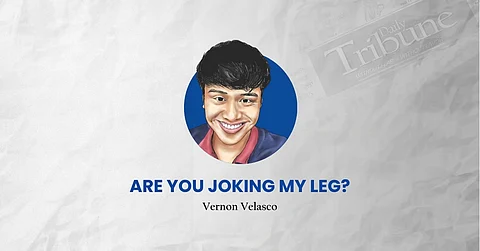
- NEWS
- the EDIT
- COMMENTARY
- BUSINESS
- LIFE
- SHOW
- ACTION
- GLOBAL GOALS
- SNAPS
- DYARYO TIRADA
- MORE

Can you believe Bongbong? He goes out and says, really seriously, “If I weren’t President, I’d rally, too.”
That’s your big man? The most powerful in the country, billions in budget, the entire government at the fingers, whining like he’s powerless?
Who does that? Only a Bongbong who accidentally wandered into a job too big for him. It’s a confession: “I don’t know what I’m doing, I’d rather be anywhere else, I wondering why I ever ran for this job.”
If you weren’t President, Bongbong, there wouldn’t be a rally, OK? That’s what you don’t understand. People would be home relaxing, watching TV, eating fragrant rice, P20, not NFA; the only reason they’re out in the heat screaming is because the President wants to act like he’s not.
You make everything about you. People embezzled billions. People are hungry. People can’t afford rice, and Bongbong says, “What about me? I’d protest, too!”
Guy creates the problem, then wants credit for pretending to be angry about it. Applause, please.
When Bongbong says, “We must act!” he means he must act. And we must watch.
Only the title forces him to show up, not competence, courage, judgment.
If your first instinct is to empathize with the angry, your second instinct should be to resign. Nobody wants a protester-in-chief.
A President’s basic psychological contract is to be above the public so he can protect it. We don’t need a president who feels our pain. We want a president who prevents the pain.
When people are protesting, most Presidents want to stop the protest, solve the problems, be the hero. Bongbong? He admits he belongs with the complainers, not the fixers. If you’re standing with the complainers, you can’t be the solution. Asking “Do we blame them?” shows he doesn’t understand that he’s in charge. That “I, too, am trapped in circumstances beyond my control.”
He goes on encouraging people to “Make your feelings known.” I nearly choked. Are you frigging with us, Bongbong? “Tell me your love language” I tell you that’s next.
Go scream into the wind. It won’t fill the bridges with concrete. At least you’ll feel heard.
The absolute worst is that Bongbong thinks this makes him relatable. He thinks saying, “I’d rally, too,” makes him one of the people when it only makes him the most confused President in Asia who is insecure about the mandate and is admitting his authority is thin. And when authority is thin, performative gestures replace structural fixes.
It’s admitting he has lost control of the stage so he is now sneaking into the audience to avoid being noticed as the villain. He’s surviving his last three years blending in so he can’t be singled out.
And while he’s out here auditioning to be a protester, the people are quietly, in their aspirations, auditioning to replace him: “If I were President, contractors would be in jail.” “If I were President, we wouldn’t need umbrellas indoors because the ceiling leaks.”
The man who has the job doesn’t want it; the people who don’t have the job would do it better. That’s never a good situation. When citizens start saying, “If I were President,” that’s a referendum, a revolution of the mind. Bongbong knows what’s coming.
In a twisted way, he is right: If he weren’t President, life would be better. He finally told the truth by accident.
